39个英文语法使用原则
英语语法规则表(完整版)
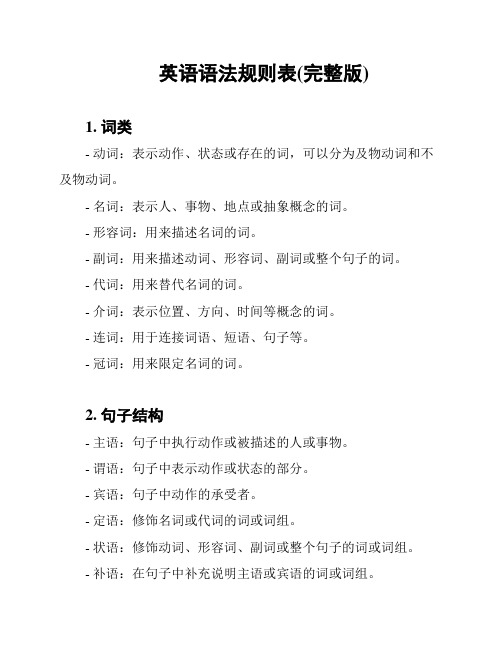
英语语法规则表(完整版)1. 词类- 动词:表示动作、状态或存在的词,可以分为及物动词和不及物动词。
- 名词:表示人、事物、地点或抽象概念的词。
- 形容词:用来描述名词的词。
- 副词:用来描述动词、形容词、副词或整个句子的词。
- 代词:用来替代名词的词。
- 介词:表示位置、方向、时间等概念的词。
- 连词:用于连接词语、短语、句子等。
- 冠词:用来限定名词的词。
2. 句子结构- 主语:句子中执行动作或被描述的人或事物。
- 谓语:句子中表示动作或状态的部分。
- 宾语:句子中动作的承受者。
- 定语:修饰名词或代词的词或词组。
- 状语:修饰动词、形容词、副词或整个句子的词或词组。
- 补语:在句子中补充说明主语或宾语的词或词组。
- 主语从句:作为主语的子句。
3. 时态- 现在时:表示目前正在进行的动作或状态。
- 过去时:表示已经发生的动作或状态。
- 将来时:表示将要发生的动作或状态。
- 现在进行时:表示目前正在进行的动作。
- 过去进行时:表示过去某一时刻正在进行的动作。
4. 语法规则- 主谓一致:主语和谓语在人称和数上要保持一致。
- 名词性从句:由连接词引导的作为名词的从句。
- 直接引语和间接引语:直接引用他人的话语或转述他人的话语。
- 并列句:由连词连接的两个或多个平行的句子。
- 从句:依存于主句的句子,起到修饰或补充说明的作用。
- 倒装句:主语和谓语的位置发生倒置。
- 非限制性定语从句:用来修饰句子的某个部分,但不影响句子的整体意思。
以上是英语语法规则的一些基本知识点,希望对您有所帮助。
更细致和深入的规则请参考相关英语语法书籍或教材。
英语基本语法规则

英语基本语法规则英语是一门重视语法的语言,掌握英语基本语法规则对于提高英语水平至关重要。
以下是一些常见的英语基本语法规则,希望能够帮助你更好地理解和使用英语。
1. 主谓一致主语和谓语动词在人称和数上保持一致。
例如:- He plays basketball every day.(他每天打篮球。
)- They play basketball every day.(他们每天打篮球。
)2. 名词复数形式大多数名词的复数形式是在词尾加上-s。
例如:- cat - cats(猫 - 猫们)- book - books(书 - 书籍)3. 动词时态英语动词有三个基本时态:现在时、过去时和将来时。
例如:- I play basketball every day.(我每天打篮球。
)(现在时)- I played basketball yesterday.(我昨天打了篮球。
)(过去时)- I will play basketball tomorrow.(我明天将打篮球。
)(将来时)4. 形容词的比较级和最高级形容词的比较级用于比较两个事物的程度,最高级用于比较三个或更多事物的程度。
例如:- The weather today is hotter than yesterday.(今天的天气比昨天热。
)(比较级)- The weather today is the hottest of the week.(今天的天气是本周最热的。
)(最高级)5. 介词用法介词用来表示时间、地点、方向、关系等。
常见的介词包括:at、in、on、by、with等。
例如:- I will meet you at the park.(我会在公园见你。
)- The book is on the table.(书在桌子上。
)6. 疑问句结构疑问句通常以助动词或疑问词开头。
例如:- Do you like ice cream?(你喜欢冰淇淋吗?)- What is your name?(你叫什么名字?)7. 定冠词和不定冠词定冠词“the”用于特指某个事物,不定冠词“a”或“an”用于泛指某个事物。
英语语法规则总结
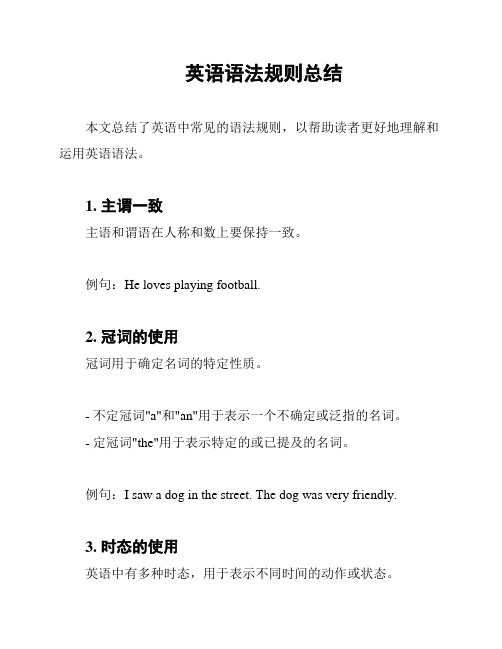
英语语法规则总结本文总结了英语中常见的语法规则,以帮助读者更好地理解和运用英语语法。
1. 主谓一致主语和谓语在人称和数上要保持一致。
例句:He loves playing football.2. 冠词的使用冠词用于确定名词的特定性质。
- 不定冠词"a"和"an"用于表示一个不确定或泛指的名词。
- 定冠词"the"用于表示特定的或已提及的名词。
例句:I saw a dog in the street. The dog was very friendly.3. 时态的使用英语中有多种时态,用于表示不同时间的动作或状态。
- 一般现在时:表示经常发生的动作或普遍事实- 进行时:表示正在进行或暂时的动作- 过去时:表示已经发生的动作或过去的状态- 将来时:表示将来要发生的动作例句:She is reading a book right now. I went to the park yesterday. They will go to the movies tomorrow.4. 连词的使用连词用于连接单词、短语或句子,使句子结构更清晰。
- 并列连词(and, or, but)用于连接并列关系的单词或短语。
- 从属连词(because, if, when)用于连接主从复合句中的从句。
例句:I like oranges and apples. I will go to the beach if it's sunny.5. 句子结构英语句子的基本结构是主语+谓语+宾语,但也可以添加其他成分来丰富句子。
例句:She is playing the piano.6. 直接引语和间接引语直接引语是直接引述他人的话,要用引号括起来;间接引语是对他人的话进行转述,不用引号。
例句:- 直接引语:He said, "I am going to the store."- 间接引语:He said that he was going to the store.7. 名词的单复数名词的单复数形式有规律和不规律两种。
英语语法原则语法一致原则

英语语法原则语法一致原则语法一致原则1. 以单数名词或代词、动词不定式短语、动名词短语或从句作主语时,谓语动词一般用单数形式;主语为复数时,谓语动词用复数形式。
如:His father is working on the farm. / To study English well is not easy. / What he said is very important for us all. / The children were in the classroom two hours ago. / Reading in the sun is bad for your eyes.注意:由what引导的主语从句,后面的谓语动词多数情况用单数形式,但若表语是复数或what从句是一个带有复数意义的并列结构时,主句的谓语动词用复数形式。
如:What I bought were three English books. / What I say and do is (are) helpful to you.2. 由连接词and或both …… and连接起来的合成主语后面,要用复数形式的谓语动词。
如:Lucy and Lily are twins. / She and I are classmates. / The boy and the girl were surprised when they heard the news. / Both she and he are Young Pioneers.注意:(1)若and所连接的两个词是指同一个人或物时,它后面的谓语动词就应用单数形式。
如:The writer and artist has come. (2)由and连接的并列单数主语前如果分别有no, each, every more than a (an) , many a (an)修饰时,其谓语动词要用单数形式。
英语语法大招100条
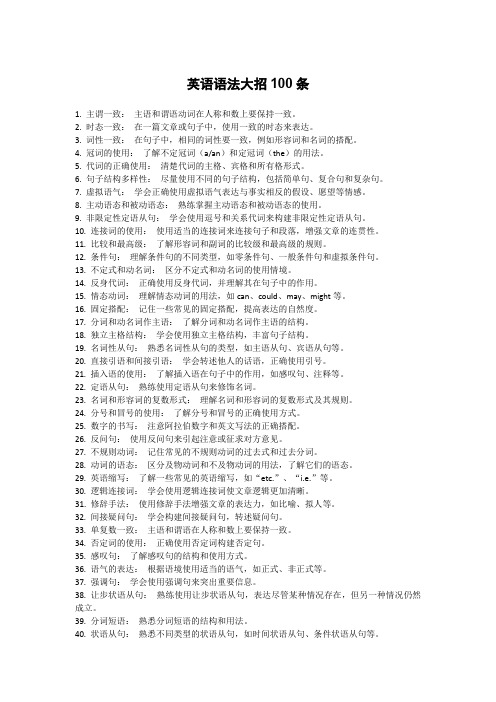
英语语法大招100条1. 主谓一致:主语和谓语动词在人称和数上要保持一致。
2. 时态一致:在一篇文章或句子中,使用一致的时态来表达。
3. 词性一致:在句子中,相同的词性要一致,例如形容词和名词的搭配。
4. 冠词的使用:了解不定冠词(a/an)和定冠词(the)的用法。
5. 代词的正确使用:清楚代词的主格、宾格和所有格形式。
6. 句子结构多样性:尽量使用不同的句子结构,包括简单句、复合句和复杂句。
7. 虚拟语气:学会正确使用虚拟语气表达与事实相反的假设、愿望等情感。
8. 主动语态和被动语态:熟练掌握主动语态和被动语态的使用。
9. 非限定性定语从句:学会使用逗号和关系代词来构建非限定性定语从句。
10. 连接词的使用:使用适当的连接词来连接句子和段落,增强文章的连贯性。
11. 比较和最高级:了解形容词和副词的比较级和最高级的规则。
12. 条件句:理解条件句的不同类型,如零条件句、一般条件句和虚拟条件句。
13. 不定式和动名词:区分不定式和动名词的使用情境。
14. 反身代词:正确使用反身代词,并理解其在句子中的作用。
15. 情态动词:理解情态动词的用法,如can、could、may、might等。
16. 固定搭配:记住一些常见的固定搭配,提高表达的自然度。
17. 分词和动名词作主语:了解分词和动名词作主语的结构。
18. 独立主格结构:学会使用独立主格结构,丰富句子结构。
19. 名词性从句:熟悉名词性从句的类型,如主语从句、宾语从句等。
20. 直接引语和间接引语:学会转述他人的话语,正确使用引号。
21. 插入语的使用:了解插入语在句子中的作用,如感叹句、注释等。
22. 定语从句:熟练使用定语从句来修饰名词。
23. 名词和形容词的复数形式:理解名词和形容词的复数形式及其规则。
24. 分号和冒号的使用:了解分号和冒号的正确使用方式。
25. 数字的书写:注意阿拉伯数字和英文写法的正确搭配。
26. 反问句:使用反问句来引起注意或征求对方意见。
英语语法规则详解
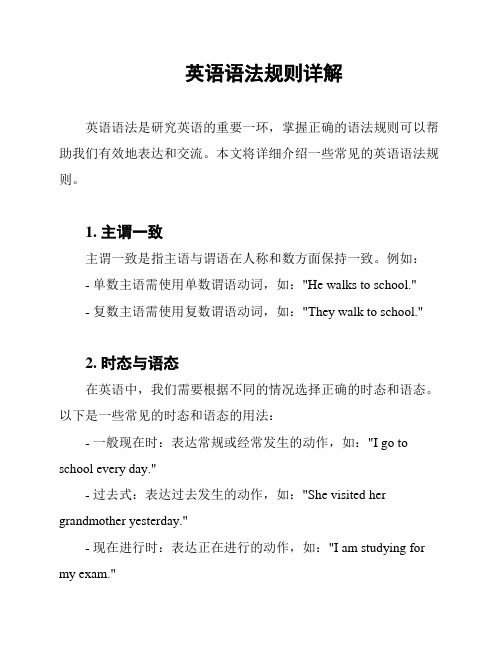
英语语法规则详解英语语法是研究英语的重要一环,掌握正确的语法规则可以帮助我们有效地表达和交流。
本文将详细介绍一些常见的英语语法规则。
1. 主谓一致主谓一致是指主语与谓语在人称和数方面保持一致。
例如:- 单数主语需使用单数谓语动词,如:"He walks to school."- 复数主语需使用复数谓语动词,如:"They walk to school."2. 时态与语态在英语中,我们需要根据不同的情况选择正确的时态和语态。
以下是一些常见的时态和语态的用法:- 一般现在时:表达常规或经常发生的动作,如:"I go to school every day."- 过去式:表达过去发生的动作,如:"She visited her grandmother yesterday."- 现在进行时:表达正在进行的动作,如:"I am studying for my exam."- 被动语态:将主语变为动作的承受者,如:"The car was washed by John."3. 冠词的使用在英语中,冠词的使用非常重要。
以下是一些常见的冠词用法:- 定冠词 "the":用于特定的人或物,如:"The book on the table is mine."- 不定冠词 "a" 和 "an":用于泛指的人或物,如:"I saw a dogin the park."4. 名词和代词名词和代词在句子中担任主语、宾语等角色。
以下是一些常见的名词和代词用法:- 可数名词:可单独计数的名词,如:"I have three dogs."- 不可数名词:不可单独计数的名词,如:"I have some milk."- 人称代词:代替特定人或物,如:"He is my friend."- 物主代词:表示所有权,如:"This is his car."以上是一些常见的英语语法规则,掌握它们可以帮助我们更好地理解和运用英语。
英语基础语法规则
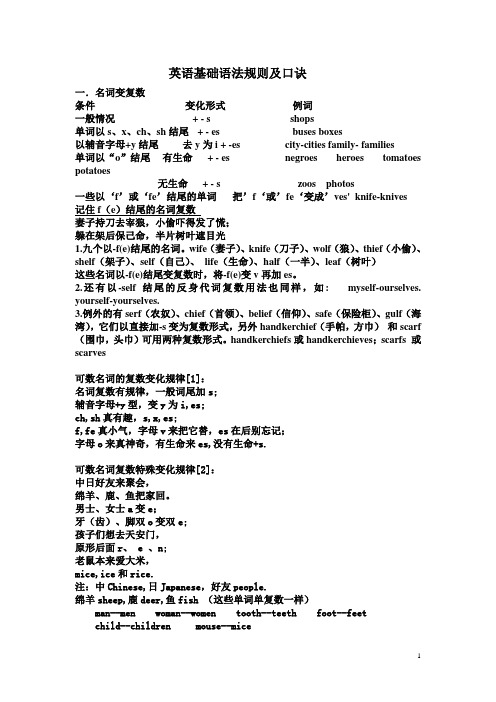
英语基础语法规则及口诀一.名词变复数条件变化形式例词一般情况+ - s shops单词以s、x、ch、sh结尾+ - es buses boxes以辅音字母+y结尾去y为i + -es city-cities family- families单词以“o”结尾有生命+ - es negroes heroes tomatoes potatoes无生命+ - s zoos photos一些以‘f’或‘fe’结尾的单词把’f‘或’fe‘变成’ves' knife-knives记住f(e)结尾的名词复数妻子持刀去宰狼,小偷吓得发了慌;躲在架后保己命,半片树叶遮目光1.九个以-f(e)结尾的名词。
wife(妻子)、knife(刀子)、wolf(狼)、thief(小偷)、shelf(架子)、self(自己)、life(生命)、half(一半)、leaf(树叶)这些名词以-f(e)结尾变复数时,将-f(e)变v再加es。
2.还有以-self结尾的反身代词复数用法也同样,如: myself-ourselves. yourself-yourselves.3.例外的有serf(农奴)、chief(首领)、belief(信仰)、safe(保险柜)、gulf(海湾),它们以直接加-s变为复数形式,另外handkerchief(手帕,方巾)和scarf (围巾,头巾)可用两种复数形式。
handkerchiefs或handkerchieves;scarfs 或scarves可数名词的复数变化规律[1]:名词复数有规律,一般词尾加s;辅音字母+y型,变y为i,es;ch,sh真有趣,s,x,es;f,fe真小气,字母v来把它替,es在后别忘记;字母o来真神奇,有生命来es,没有生命+s.可数名词复数特殊变化规律[2]:中日好友来聚会,绵羊、鹿、鱼把家回。
男士、女士a变e;牙(齿)、脚双o变双e;孩子们想去天安门,原形后面r、 e 、n;老鼠本来爱大米,mice,ice和rice.注:中Chinese,日Japanese,好友people.绵羊sheep,鹿deer,鱼fish (这些单词单复数一样)man--men woman--women tooth--teeth foot--feetchild--children mouse--mice我用am,你用are,is连着他,她,它;单数名词用is,复数名词全用are. 变疑问,往前提,句末问号莫丢弃;变否定,更容易,be后not莫忘记疑问否定任你变,句首大写莫迟疑年月周前要用in,日子前面却不行遇到几号要用on,上午下午又是in.要说某日上下午,用on换in才能行午夜黄昏须用at,黎明用它也不错at也用在明分前,说差可要用上to,说过只可使用past,多说多练牢牢记,莫让岁月空蹉跎一般现在时态(一)I、we、you、they作主语,动词原形后面跟;否定句,更容易,动词前面加don't; 疑问句,别着急,句首Do,来帮你,后面问号别忘记;肯定回答用Yes, I、we、you、they加上do;否定回答要用No, I、we、you、they加don't.(二)主语三单他、她、它,动三形式后面压,词尾一般s加;辅音字母+y型,变y为i,es;ch,sh真有趣, s,x,es;三个特殊那里去? has、goes和does;否定句,记住它,动词前面doesn't;疑问句,别着急,句首Does,来帮你;肯定回答用Yes, he、she、it加does;否定回答要用No, he、she、it、doesn't;Does、doesn't来帮你,后面动词定注意,恢复原形要切记。
英语单词用法规则

英语单词用法规则一、名词(n.)1. 可数名词复数形式。
- 一般情况在词尾加 -s,如:book[bʊk](单数) - books[bʊks](复数)。
- 以s, x, ch, sh结尾的名词,加 -es,如:box[bɒks] - boxes[bɒksɪz]。
- 以辅音字母 + y结尾的名词,变y为i,再加 -es,如:city[ˈsɪti] - cities[ˈsɪtiz]。
- 以f或fe结尾的名词,有些变f或fe为v,再加 -es,如:leaf[liːf] - leaves[liːvz]。
2. 名词所有格。
- 有生命的名词所有格,一般在名词后加's,如:Tom's book。
如果名词复数以-s结尾,只加',如:students' books。
- 无生命的名词所有格常用“of + 名词”结构,如:the window of the room。
二、动词(v.)1. 一般现在时第三人称单数形式。
- 一般情况在词尾加 -s,如:like[laɪk] - likes[laɪks]。
- 以s, x, ch, sh, o结尾的动词,加 -es,如:go[gəʊ] - goes[gəʊz],watch[wɒtʃ] - watches[wɒtʃɪz]。
- 以辅音字母 + y结尾的动词,变y为i,再加 -es,如:study[ˈstʌdi] - studies[ˈstʌdiz]。
2. 动词的过去式和过去分词。
- 规则变化。
- 一般情况在词尾加 -ed,如:work[wɜːk] - worked[wɜːkt]。
- 以e结尾的动词加 -d,如:live[lɪv] - lived[lɪvd]。
- 以“辅音字母 + y”结尾的动词,变y为i,再加 -ed,如:cry[kraɪ] - cried[kraɪd]。
- 重读闭音节且末尾只有一个辅音字母的动词,双写这个辅音字母,再加 -ed,如:stop[stɒp] - stopped[stɒpt]。
英语语法最基本规则

绝大多数的英文问句子是一定要有助动词,以下全是 正确的英文问句,你可以看出每一句的助动词吗? Do you love me? Did you go to school yesterday? How many books do you have? How much money does he have? Why don’t you go back home? Do you like to swim? Can you play violin? Will you go home tomorrow? Would you give me a call?
“我爱游泳”,因此有两种正确的译法: I love to swim. I love swimming. 以下的句子都是正确的: I hate to eat fish. I hate eating fish. I love to play basketball. I love playing basketball I keep going to church.
这个句子也犯了同样的错
以下几个句子都是错的,因为这些句子中都有两个动 词连在一起的情形: I hate eat fish. I love play basketball. I love swim. 如果你一定要讲“我爱游泳”,怎么办呢?请看以下的 规则。
规则(2):如一定要同时用两个动词,后者的 前面必须加“to”或者将后者加入“ing”。
ቤተ መጻሕፍቲ ባይዱ
请注意,在以上的句子中,do和did都是助动词,do是现在 式,did是过去式。 关于现在式和过去式,究竟是怎么一回事,以后我们会解 释清楚的。 助动词不限于“do”和它的变型,can、will、would、shall、 may、must等等都是助动词,因此,以下的英文句子又都 是对的: He can not swim. They will not go to church tomorrow. Mary should not go to the party. I shall not see you. He may not go out tonight. He must not eat meat any more.
(完整版)常见语法规则大全

(完整版)常见语法规则大全常见语法规则大全1.主谓一致- 当主语为单数时,谓语动词使用单数形式;当主语为复数时,谓语动词使用复数形式。
2.时态一致- 句子中的动词时态应与上下文保持一致。
3.代词一致- 当代词与其所指的名词在人称、单复数、格等方面保持一致。
4.冠词使用- 当指的是特定的事物时,使用定冠词"the";当指数量不确定的事物时,使用不定冠词"a"或"an"。
5.主动语态与被动语态- 主动语态表示主语执行动作;被动语态表示主语接受动作。
6.词性一致- 句子中的词类应保持一致,如名词、动词、形容词等。
7.比较级和最高级- 当进行比较时,使用比较级;当和一组物体进行比较时,使用最高级。
8.倒装语序- 当句子以否定词开头或以表示否定意义的状语或介词短语开头时,采用倒装语序。
9.介词的正确使用- 使用正确的介词来表示时间、地点、原因、方式等。
10.连词的使用- 使用适当的连词来连接句子,例如 "and"、"but"、"or" 等。
11.并列结构- 并列结构中的各个成分应保持平衡,使用相同的结构形式和词性。
12.直接引语和间接引语- 直接引语用引号括起来,表示说话人的原话;间接引语则转述说话人的意思,不使用引号。
13.句子简洁明了- 句子应简洁明了,避免使用冗长的词语和句子结构。
14.标点符号的使用- 使用适当的标点符号来分隔句子和表示停顿、强调等。
15.拼写和用词准确- 注意单词的正确拼写和用法,避免语法错误和歧义。
以上是常见的语法规则大全,希望对您有所帮助。
25个英语语法口诀
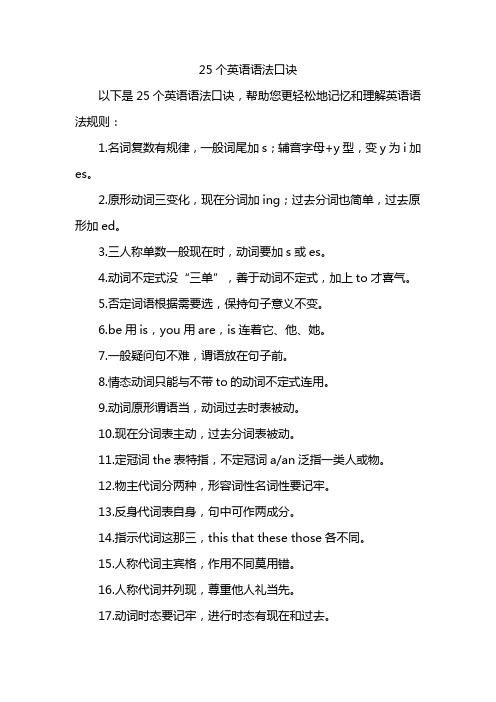
25个英语语法口诀
以下是25个英语语法口诀,帮助您更轻松地记忆和理解英语语法规则:
1.名词复数有规律,一般词尾加s;辅音字母+y型,变y为i加es。
2.原形动词三变化,现在分词加ing;过去分词也简单,过去原形加ed。
3.三人称单数一般现在时,动词要加s或es。
4.动词不定式没“三单”,善于动词不定式,加上to才喜气。
5.否定词语根据需要选,保持句子意义不变。
6.be用is,you用are,is连着它、他、她。
7.一般疑问句不难,谓语放在句子前。
8.情态动词只能与不带to的动词不定式连用。
9.动词原形谓语当,动词过去时表被动。
10.现在分词表主动,过去分词表被动。
11.定冠词the表特指,不定冠词a/an泛指一类人或物。
12.物主代词分两种,形容词性名词性要记牢。
13.反身代词表自身,句中可作两成分。
14.指示代词这那三,this that these those各不同。
15.人称代词主宾格,作用不同莫用错。
16.人称代词并列现,尊重他人礼当先。
17.动词时态要记牢,进行时态有现在和过去。
18.完成时态有四种,已经完成和未完成。
19.被动语态别忘了,be加过去分词就好。
20.虚拟语气常常用,表示祝愿和假设。
21.非谓语动词作用大,可以做定语、状语和补足语。
22.连词用来连接词,从句分为主从复合句。
23.冠词限定名词用,不定冠词泛指一类人或物。
24.形容词用来修饰名,副词修饰动形副。
25.数词表示数量和顺序,分数倍数表达清。
英语日常交流语法

英语日常交流语法英语是全球通用的语言之一,掌握良好的英语语法对于日常生活和工作非常重要。
在日常交流中,正确的语法使用不仅能够让我们表达思想更清晰,还能够提高沟通效率和表达能力。
本文将介绍一些英语日常交流中常用的语法规则,帮助读者提升英语交流能力。
一、基本语法规则1.主谓一致:主语与谓语在人称和数上要保持一致。
例如:She is a teacher.(她是一位老师。
)2.时态使用:根据不同的情况使用不同的时态,如一般现在时、一般过去时、现在进行时、过去进行时等。
例如:I am studying English.(我正在学英语。
)3.介词的正确使用:介词的搭配要符合英语的表达习惯,如look forward to(期待)、depend on(依赖)。
例如:I am looking forward to the weekend.(我期待周末。
)4.冠词的运用:冠词分为定冠词(the)、不定冠词(a/an)和零冠词。
如使用不定冠词表示泛指,使用定冠词表示特指。
例如:I have a new car.(我有一辆新车。
)二、常用语法点1.被动语态:被动语态的构成为助动词(be)+及物动词的过去分词。
被动语态适用于强调动作的接受者。
例如:The book was written by the author.(这本书是作者写的。
)2.虚拟语气:表示与事实相反的假设语气,有三种情况:与过去事实相反的虚拟、与现在事实相反的虚拟和与将来事实相反的虚拟。
例如:If I were you, I would studyharder.(如果我是你,我会更加努力学习。
)3.倒装句:在特定情况下,主语和谓语的位置会互换,常见于疑问句、条件句和表示地点的句子中。
例如:Only in this way can we solve the problem.(只有这样我们才能解决问题。
)三、常见错误及纠正1.动词时态错误:如使用了错误的时态,应根据情况纠正。
英语语法规则总结

英语语法规则总结
一、主谓一致
主语和谓语在人称和数上要保持一致,即单数主语用单数谓语动词,复数主语用复数谓语动词。
二、时态一致
主语和谓语在时态上要保持一致,即一般现在时的主语用一般现在时的谓语动词,过去时的主语用过去时的谓语动词。
三、代词一致
代词和其所指的名词在人称、数和格上要保持一致,即代词与其限定的名词在人称、数和格上要保持一致。
四、倒装句
当句首是否定词、表示方位或时间的状语,或者是句子中的某部分时,常常要用倒装语序。
五、并列句
使用连词and、or、but等连接的句子,谓语动词的形式应与最
邻近的主语保持一致。
六、从句
主句和从句在时态和语态上要保持一致,即主句和从句的时态
和语态必须一致。
七、形容词和副词的比较级和最高级
形容词和副词有原级、比较级和最高级三种形式,根据不同情
况使用相应的形式。
八、介词
介词用于表示人或事物的关系,并根据不同的关系使用相应的
介词。
九、冠词
冠词用于指示名词,并根据名词的性质和数量使用相应的冠词。
十、动词时态和语态
动词根据时间的不同使用不同的时态,根据语态的不同使用不同的语态。
十一、虚拟语气
虚拟语气用于表示与事实相反、希望或建议等情况,并使用相应的虚拟形式。
以上是英语的一些基本语法规则总结,希望对您有所帮助。
48条语法顺口溜

48条语法顺口溜以下是有关语法的顺口溜,希望能帮助您记住一些常见的语法规则:1. 主谓一致别忘记,动词形态要保持。
2. 名词复数变"s",加"es" 或换"ies"。
3. 定冠词"the" 要记牢,特指事物放心跳。
4. 不定冠词"a" 或"an",后面单数再出现。
5. 形容词前面来修饰,大小、颜色要说清。
6. 副词修饰动词、形、副,程度、方式都有点。
7. 句子开头大写字母,句号问号别放松。
8. 主语动作句首开,陈述疑问别混搅。
9. 名词性从句要了解,宾语、主语别分错。
10. 形容词从句要明白,修饰名词别失格。
11. 副词从句要掌握,时间、原因别分不清。
12. 宾语从句别漏掉,用连接词来铺陈。
13. 表语从句别忽视,连系动词要留神。
14. 复合句里的连接词,连接意思别混乱。
15. 并列连词"and"、"but",连接词充当黏合剂。
16. 选择"or"、"either"、"neither",多个项目能排列。
17. "if" 条件,假设做陪衬,虚拟语气别弄错。
18. 时间连词用得对,"when"、"while" 有区别。
19. 强调句"it is...that",主语要提前。
20. 反义疑问是要懂,情态动词别忽视。
21. 句中省略要注意,"do" 、"have" 不可少。
22. 感叹句"How" 不要漏,"What" 做主语很妙。
23. 非限制性定语从句,逗号分隔别忘记。
24. 比较级要变化,用"than" 连起来。
英语语法口诀大全
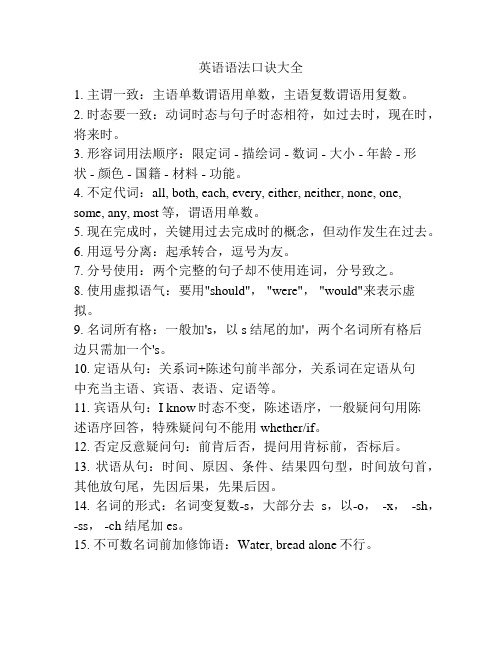
英语语法口诀大全1. 主谓一致:主语单数谓语用单数,主语复数谓语用复数。
2. 时态要一致:动词时态与句子时态相符,如过去时,现在时,将来时。
3. 形容词用法顺序:限定词 - 描绘词 - 数词 - 大小 - 年龄 - 形状 - 颜色 - 国籍 - 材料 - 功能。
4. 不定代词:all, both, each, every, either, neither, none, one, some, any, most等,谓语用单数。
5. 现在完成时,关键用过去完成时的概念,但动作发生在过去。
6. 用逗号分离:起承转合,逗号为友。
7. 分号使用:两个完整的句子却不使用连词,分号致之。
8. 使用虚拟语气:要用"should", "were", "would"来表示虚拟。
9. 名词所有格:一般加's,以s结尾的加',两个名词所有格后边只需加一个's。
10. 定语从句:关系词+陈述句前半部分,关系词在定语从句中充当主语、宾语、表语、定语等。
11. 宾语从句:I know时态不变,陈述语序,一般疑问句用陈述语序回答,特殊疑问句不能用whether/if。
12. 否定反意疑问句:前肯后否,提问用肯标前,否标后。
13. 状语从句:时间、原因、条件、结果四句型,时间放句首,其他放句尾,先因后果,先果后因。
14. 名词的形式:名词变复数-s,大部分去s,以-o,-x,-sh,-ss, -ch结尾加es。
15. 不可数名词前加修饰语:Water, bread alone不行。
这只是一些常见的英语语法口诀,实际上英语语法非常复杂广泛,还有许多其他的规则需要掌握和运用。
掌握基本的语法规则是学习英语的基础,但也需要在实际应用中灵活运用。
英语语法规则总结本
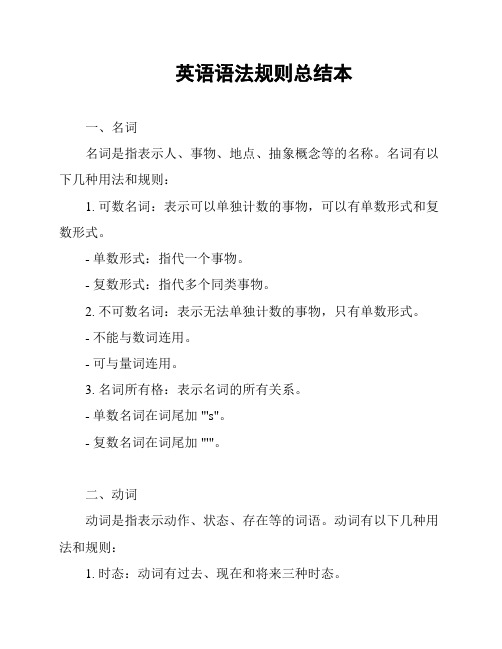
英语语法规则总结本一、名词名词是指表示人、事物、地点、抽象概念等的名称。
名词有以下几种用法和规则:1. 可数名词:表示可以单独计数的事物,可以有单数形式和复数形式。
- 单数形式:指代一个事物。
- 复数形式:指代多个同类事物。
2. 不可数名词:表示无法单独计数的事物,只有单数形式。
- 不能与数词连用。
- 可与量词连用。
3. 名词所有格:表示名词的所有关系。
- 单数名词在词尾加 "'s"。
- 复数名词在词尾加 "'"。
二、动词动词是指表示动作、状态、存在等的词语。
动词有以下几种用法和规则:1. 时态:动词有过去、现在和将来三种时态。
- 过去时:表示过去发生的动作或状态。
- 现在时:表示现在正在进行的动作或状态。
- 将来时:表示将来要发生的动作或状态。
2. 语态:动词有主动语态和被动语态两种语态。
- 主动语态:表示主语是动作的执行者。
- 被动语态:表示主语是动作的承受者。
3. 祈使句:表示命令、请求、建议等的句子。
- 谓语动词用原形。
- 用来表示请求时,可以在句首加上 "请"。
三、形容词形容词是指修饰名词、代词等词语的词语,用于描述事物的特征、性质等。
形容词有以下几种用法和规则:1. 形容词作前置定语:形容词位于名词前面,并与名词构成描述关系。
- 一般情况下,形容词在单数名词前加不定冠词 "a" 或 "an",在复数名词前加 "some"。
2. 形容词作表语:形容词位于系动词之后,用于描述主语的特征。
- 系动词包括 "be"、"seem"、"look" 等。
- 不定冠词 "a" 或 "an" 可以与形容词连用,表示一种特征。
以上是英语语法规则的简要总结,有助于理解和掌握英语语法的基本要点。
英语用法规则

英语用法规则1. 主语与动词的一致:主语的单复数与动词要保持一致。
例:He plays tennis every day.(主语he是第三人称单数,所以动词plays要用单数形式)2. 句子的基本结构:英语句子通常由主语、谓语和宾语构成,基本结构为SVO(Subject-Verb-Object)。
例:She eats an apple.(主语是she,动词是eats,宾语是an apple)3. 时态的正确使用:时态表示动作或状态的时间。
常见的时态有一般现在时、一般过去时、一般将来时等。
例:I go to school every day.(go是一般现在时)My friend visited me yesterday.(visited是一般过去时)4. 使用适当的冠词:a/an、the等冠词用于限定名词的范围或表示特指。
例:I saw a cat in the street.(a用于不特定的单数名词cat)The cat is very cute.(the用于特定的名词cat)5. 名词单复数的变化:英语名词通过在词尾加-s或-es来表示复数。
例:I have two cats.(cat的复数是cats)She has three books.(book的复数是books)6. 形容词的顺序:形容词通常放在名词前面,并按照顺序排列,比如大小、年龄、形状、颜色等。
例:I bought a beautiful big house.(beautiful和big都是形容词,按照顺序排列)7. 状语的位置:状语一般放在句子的中间或句尾,表示时间、地点、方式、原因等。
例:He went to the supermarket yesterday.(yesterday是状语,表示时间)8. 使用正确的介词:介词用于表示名词与其他词之间的关系,如位置、方向、时间等。
例:She is sitting on the chair.(on表示位置)9. 句子的语序:英语语法中,一般的语序是主语-动词-宾语(SVO)。
英语词汇语法用法小结
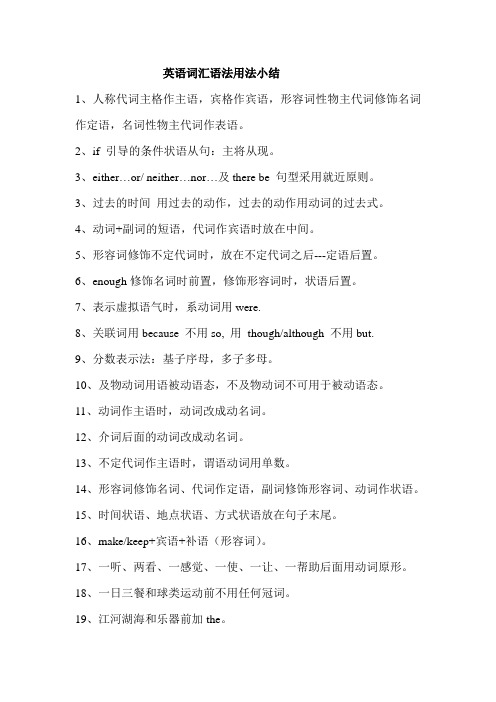
英语词汇语法用法小结1、人称代词主格作主语,宾格作宾语,形容词性物主代词修饰名词作定语,名词性物主代词作表语。
2、if 引导的条件状语从句:主将从现。
3、either…or/ neither…nor…及there be 句型采用就近原则。
3、过去的时间用过去的动作,过去的动作用动词的过去式。
4、动词+副词的短语,代词作宾语时放在中间。
5、形容词修饰不定代词时,放在不定代词之后---定语后置。
6、enough修饰名词时前置,修饰形容词时,状语后置。
7、表示虚拟语气时,系动词用were.8、关联词用because 不用so, 用though/although 不用but.9、分数表示法:基子序母,多子多母。
10、及物动词用语被动语态,不及物动词不可用于被动语态。
11、动词作主语时,动词改成动名词。
12、介词后面的动词改成动名词。
13、不定代词作主语时,谓语动词用单数。
14、形容词修饰名词、代词作定语,副词修饰形容词、动词作状语。
15、时间状语、地点状语、方式状语放在句子末尾。
16、make/keep+宾语+补语(形容词)。
17、一听、两看、一感觉、一使、一让、一帮助后面用动词原形。
18、一日三餐和球类运动前不用任何冠词。
19、江河湖海和乐器前加the。
20、表示一天的某时用in,表示某天的某时用on,表示几点几分用at,表示月、季、年用in。
21、a little, much, even, far, still 可修饰比较级。
22、one of + 最高级+ 名词复数。
23、两者比较用比较级,三者或三者以上比较用最高级。
24、单音节词的比较级加er,最高级加est,部分双音节词和多音节的比较级前加more, 最高级前加most。
25、两者比较强调一者时,比较级前也加the。
26、附加疑问句:前肯后否,前否后肯。
27、表示客观存在、客观真理、自然现象时,用一般现在时。
28、感叹句中How修饰形容词、副词,What 修饰名词。
初中英语语法规则大全
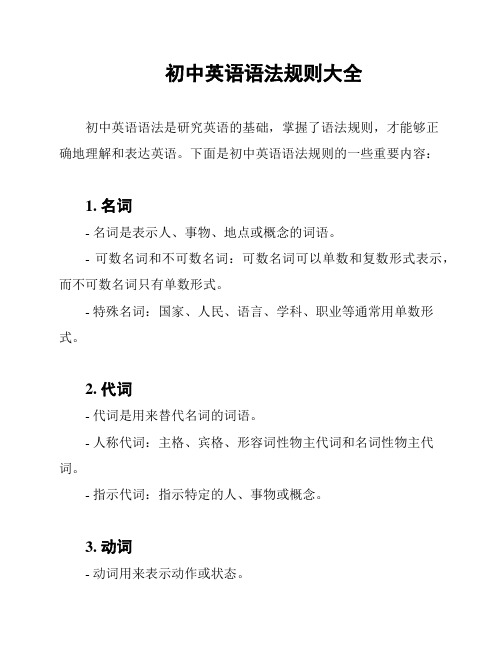
初中英语语法规则大全初中英语语法是研究英语的基础,掌握了语法规则,才能够正确地理解和表达英语。
下面是初中英语语法规则的一些重要内容:1. 名词- 名词是表示人、事物、地点或概念的词语。
- 可数名词和不可数名词:可数名词可以单数和复数形式表示,而不可数名词只有单数形式。
- 特殊名词:国家、人民、语言、学科、职业等通常用单数形式。
2. 代词- 代词是用来替代名词的词语。
- 人称代词:主格、宾格、形容词性物主代词和名词性物主代词。
- 指示代词:指示特定的人、事物或概念。
3. 动词- 动词用来表示动作或状态。
- 动词的时态:一般现在时、一般过去时、一般将来时等。
- 动词的语态:主动语态和被动语态。
4. 形容词- 形容词用来描述名词或代词。
- 形容词的级别:原级、比较级和最高级。
5. 副词- 副词用来修饰动词、形容词、副词或整个句子。
- 副词的种类:时间副词、地点副词、方式副词等。
6. 冠词- 冠词用来限定名词。
- 定冠词:the- 不定冠词:a, an7. 介词- 介词用来表示关系、位置或方向。
- 常见的介词:at, in, on, from, to, with等。
8. 连词- 连词用来连接词语、短语或句子。
- 并列连词:and, but, or等。
- 从属连词:because, if, when, although等。
9. 句子结构- 英语句子通常由主语、谓语和宾语构成。
- 主谓一致:主语和谓语在人称和数上保持一致。
以上是初中英语语法规则的一些基本内容,希望对你有所帮助!。
- 1、下载文档前请自行甄别文档内容的完整性,平台不提供额外的编辑、内容补充、找答案等附加服务。
- 2、"仅部分预览"的文档,不可在线预览部分如存在完整性等问题,可反馈申请退款(可完整预览的文档不适用该条件!)。
- 3、如文档侵犯您的权益,请联系客服反馈,我们会尽快为您处理(人工客服工作时间:9:00-18:30)。
39个英文语法原则1. Avoid ending sentences with a preposition (of, with, for, etc.) as long as the flow is natural. If not, then go ahead... it's OK.2. Place adverbs next to the verb whenever possible. (Turn on the television. Not: Turn the television on.)3. Use a colon to introduce a list or concept that expands upon the statement preceding the colon.4. Use commas to indicate a pause or clause. Caution-incorrect comma placement can dramatically change meaning.5. A semicolon separates two related, independent clauses (complete sentences).6. Use vibrant verbs! Nix mundane language by choosing specific, lively verbs.7. When abbreviating a year, use an apostrophe, not an opening single quotation mark: '99, NOT '99.8. No commas necessary before an ampersand (&). It's like using 2 punctuation marks in a row, and very technically wrong.9. Use a comma between 2 adjectives if 'and' can be placed between them & still make sense. If not, no comma needed.10. a.m./p.m.-always lowercase with periods & avoid redundancy: "2 p.m. in the afternoon."11. Per AP: Italicize book titles & place in quotations; Per Chicago: Italicize book titles, no quotations.12. Fewer vs. Less-In general, use fewer w/countable items & less w/measurable items (containing mass).13. Do you mix up these adjectives? Discreet (prudence/restraint in speech, behavior) / Discrete (separate, distinct).14. A question can be styled as an exclamation: How could I have known!15. Do you mix up these nouns? Compliment (expression of praise, respect) / Complement (something that completes/makes whole).16. Place punctuation in quotations when part of matter: Did I say, "Yes"?; I said, "Yes!"17. Use a colon after "as follows," "the following," and similar expressions, but not after "for example," or "namely."18. Separate "etc." with commas, unless it ends a sentence: You may skip, hop, walk, etc., but don't run.19. Not sure about colon use? Here's a trick: the words preceding a colon should always comprise a complete sentence.20. Use the singular form of the following:upward, downward, backward, forward, afterward, toward. Add an -s when in Britain.21. Sacrilegious is spelled with an 'ile,' not 'eli.'22. Eliminate the, that, very, really & other filler words. Your writing will be more concise.23. Refer to people as who: The woman who ran a mile... Not, the woman that ran a mile.24. In the U.S. use double quotations for a quoted word, phrase & sentence. Use single quotations for a quote within a quote.25. Place a comma after Oh or Ah if there is no other punctuation or unless it is part ofa phrase: Oh boy! Oh yeah? Ah yes!26. A word/phrase following 'so-called' doesn't require quotations unless needed to emphasize only 1 part of the phrase.27. A dependent clause preceding a main clause should always be followed by a comma.28. Use 'a' before words beginning w/a consonant sound: a historic place. Use 'an' before words beginning w/a vowel sound: an herb.29. When a repeated adjective appears before a noun, separate with a comma. Many, many people use Twitter daily.30. Hyphenate titles of elected officials not yet in office unless title is open compound: president-elect, but vice president elect31. Italicize poem/opera/long musical comp titles. Song titles & shorter musical comps are set in Roman & in quotations.32. "My sister, Sally," if she is your only sister. "My sister Sally" if you have more than one sister.33. Biannual & semiannual mean twice per year. Biennial means once every 2 years (or every other year).34. Colons & semicolons follow closing quotation marks. Periods & commas always precede.35. Question marks & exclamation points follow closing quotation marks unless part of the quoted matter.36. etc. is ALWAYS used to complete a list, is preceded by a comma, followed by a period & ALWAYS lowercase.37. In order to & in order for can often be reduced to 'to' or 'for.' Always best to say the same thing with fewer words.38. Never use numbers to express noon/midnight, except in 24-hour system. 12:00am & 12:00pm can be ambiguous.39. Born vs. borne: Borne=She has borne 2 children. Born=adj. or passive verb:a born singer/being born into poverty。
